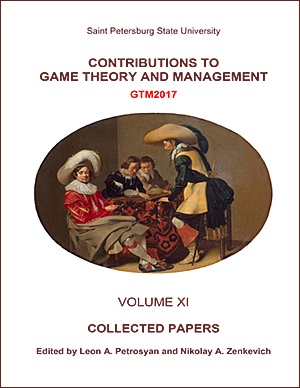A Survey on Cooperative Stochastic Games with Finite and Infinite Duration
Abstract
The paper is a survey on cooperative stochastic games with finite and infinite duration which based on the author's and coauthors' publications. We assume that the non-cooperative stochastic game is initially defined. The cooperative version of the game is constructed, the cooperative solutions are found. The properties of cooperative solutions of the game which are realised in dynamics are considered. Several numerical examples of stochastic games illustrate theoretical results.
Keywords:
cooperative stochastic game, cooperative solution, imputation distribution procedure, subgame consistency
Downloads
References
Downloads
Published
How to Cite
Issue
Section
License
Articles of "Contributions to Game Theory and Management" are open access distributed under the terms of the License Agreement with Saint Petersburg State University, which permits to the authors unrestricted distribution and self-archiving free of charge.




